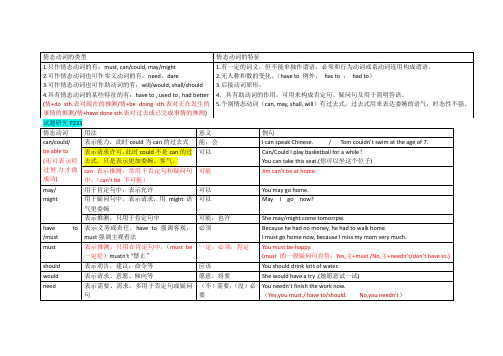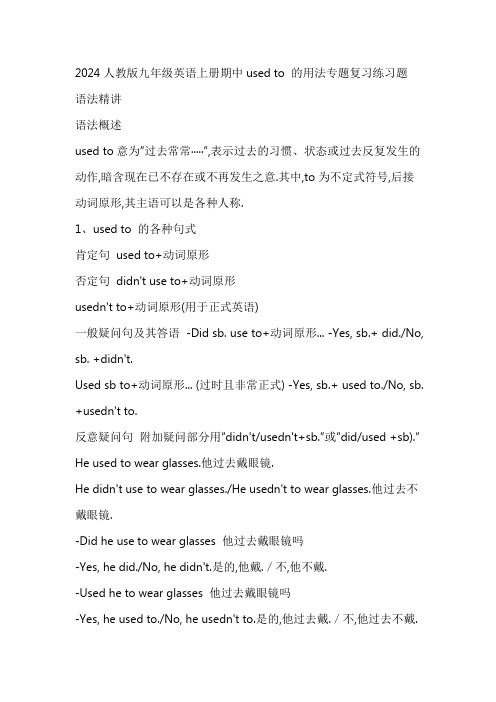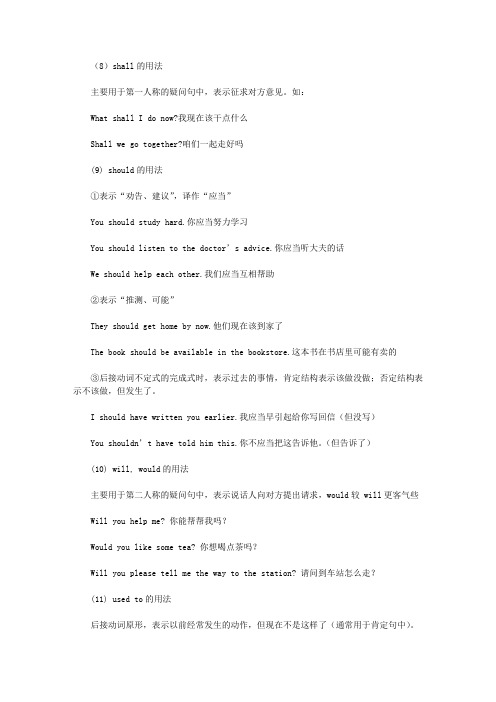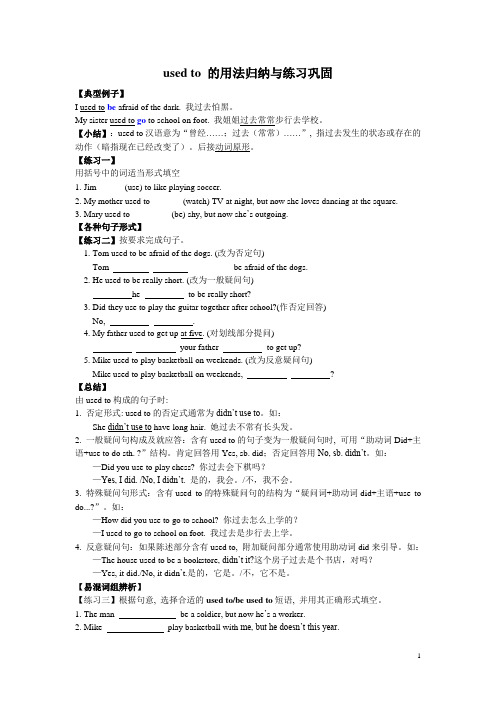情态动词和used to的用法同步练习
情态动词、used to,suppose,make,by,动名词

use sth. to do sth.用……做…..
反义疑问句
……did +主?/didn’t +主?……used +主?/ usedn’t +主?
(对反义疑问句的回答:赞同用Yes,主+did./不赞同用:No,主+didn’t.)
beused by被…….所用
敢于
常用于疑问句,否定句和条件从句中
dare和need都可作实义动词有人称,时态和数的变化,肯定句:dare to do sth.
疑问句,否定句:dare (to) do sth.
而need只有:need to do sth.
shall
用于第一人称,表示征求对方的意见
What shall we do this morning?(Shall I/we……)
猜想某人做某事。
make“制作”
make sth.制作……
We will make a kite.
make“使(要)某人(事物)做什么(怎么样)”
make+名词/代词+形容词
“使某人(感到)……”
The book makes me happy.
make+名词/代词+动词原形(省略to的不定式)
“使某人做……”
He walked by mewithoutsaying anything.
5.by表示根据意为“按照”
What time is it by your watch.
6.by表示被接触身体的某一部分。
She took me by the hand.
动名词在句中的用法:
2024人教版九年级英语上册期中used to 的用法专题复习练习题(答案解析)

2024人教版九年级英语上册期中used to 的用法专题复习练习题语法精讲语法概述used to意为”过去常常·····”,表示过去的习惯、状态或过去反复发生的动作,暗含现在已不存在或不再发生之意.其中,to为不定式符号,后接动词原形,其主语可以是各种人称.1、used to 的各种句式肯定句used to+动词原形否定句didn't use to+动词原形usedn't to+动词原形(用于正式英语)一般疑问句及其答语-Did sb. use to+动词原形... -Yes, sb.+ did./No, sb. +didn't.Used sb to+动词原形... (过时且非常正式) -Yes, sb.+ used to./No, sb. +usedn't to.反意疑问句附加疑问部分用”didn't/usedn't+sb.”或”did/used +sb).”He used to wear glasses.他过去戴眼镜.He didn't use to wear glasses./He usedn't to wear glasses.他过去不戴眼镜.-Did he use to wear glasses 他过去戴眼镜吗-Yes, he did./No, he didn't.是的,他戴./不,他不戴.-Used he to wear glasses 他过去戴眼镜吗-Yes, he used to./No, he usedn't to.是的,他过去戴./不,他过去不戴.He used to wear glasses, didn't he 他过去戴眼镜,不是吗He usedn't to wear glasses, used he 他过去不戴眼镜,是吗2、used to的there be结构used to 用于there be结构中时,形式为there used to be,表示”过去曾有”.There used to be a private school here.这儿曾经有一所私立学校.3、used to的相似结构辨析used to do sth. 过去常常做某事只用于过去时be/get used to doing sth. 习惯于做某事用于现在、过去或将来时等多种时态be used to do sth. 被用于做某事用于多种时态People should get used to travelling by public transportation.人们应该习惯于乘坐公共交通工具出行.Stamps can be used to send letters.邮票可以用来寄信.基础训练一、单项选择1.— Are you a teacher—No, I’m not, but I was. I ________ teach English in a middle school. A.used to B.was used to C.di dn’t use to D.did use to 2.—Jane got high marks in the Chinese exam.—________ big progress she has made! She ________ weak in English. A.What a; used to be B.What; used to beC.How; used to be D.How a; was used to being3.I ________ late. But now I ________ up early.A.used to get up; am used to getting B.used to sleeping; am used to getC.am used to sleeping; used to get D.used to get up; am used for getting4.The China you see today is quite a different country from the one it ________.A.used to being B.is used to be C.used to be D.is used to being 5.—________ she use to have short hair—Yes. But her hair is long now.A.Does B.Was C.Did D.Is6.—________ he use to live in a city—Yes, but after moving here, he ________ the life in a village. A.Did, used to B.Was, is getting used to C.Did, is used to 7.He used to ________ books to relax himself, but now he has been used to ________ mountains.A.read; climb B.reading; climb C.read; climbing D.reading; climbing8.Amy ________ be a shy girl and hardly talked with others.A.is used to B.used to C.was used to D.use to9.— She hardly used to ride her bike to school, did she—________. She always took the bus.A.Yes, she did B.Yes, she didn’tC.No, she did D.No, she didn’t10.There ________ thick forests here, but now it’s a new school. A.used to have B.were used to having C.used to be二、完成句子11.Joseph used to go swimming in summer. (对划线部分提问) What Joseph use to in summer12.There used to be lots of rain in this season. (改为一般疑问句) there to be lots of rain in this season13.Paula used to be popular in school.(改为否定句)Paula to be popular in school.14.Linda hardly used to go to the library. (改为反意疑问句) Linda hardly used to go to the library,15.—Did Sally use to eat junk food (作否定回答)— , she .提升训练一、单项选择1.Jae used to __________ in the small village. Now he get used to __________ in the big city.A.live; living B.living; living C.live; live D.living; live 2.Tina isn’t as shy as she ________. She ________ to sing in front ofcrowds.A.is, dares B.used, dare C.are used to be, dare D.used to be, dares3.—How does Jack usually go to school—He ________ a bus, but now he ________ there to keep healthy. A.used to take; is used to walkingB.is used to take; used to walkC.is used to taking; used to walk4.This robot ________ cut paper.A.is used for B.used to be C.is used to D.is used as 5.The river in my village is clean now. However, it ________ polluted seriously.A.is used to be B.was used to be C.used to be D.was used to being6.—Lucy, the spoon is used to ________ the soup.—O h, I see. But I’m not used to ________ it.A.have; use B.having; using C.having; use D.have; using 7.The hole (坑) ________ a swimming pool but now it ________ fish. A.is used to be; is used to keep B.used to be; is used to keep C.used to be; is used to keeping D.is used to be; is used to keep a lot8.There________a cinema in the center of our town, but now amiddle school stands there.A.is used to be B.is used to being C.used to be D.used to being 9.There ________ a lot of trees here, but now it has become desert. A.is B.are C.used to be D.used to being10.Jack _______ dislike the weather in Beijing in spring, but now he _______ it.A.is used to, used to B.used to, used toC.was used to, gets used to D.used to, gets used to二、完成句子11.我的爷爷习惯每天早上浏览报纸。
used to作为情态动词的用法

“used to”作为情态动词,只有过去式一种形式,表示过去存在的但现在已结束的习惯动作或状态,后面接动词原形,否定式是“usedn’t to”或者“didn’t use to”。
它没有人称和数的变化,也没有现在式和过去分词形式。
下面是一些具体的例句:
He used to smoke,but he doesn’t now.(他过去吸烟,但现在不吸了。
)
They didn’t use to live here.(他们过去没住在这里。
)
需要注意的是,“used to”只能用于过去持续或经常发生的事,不能用于将要发生的事。
此外,“used to”后可跟名词、代词、动名词、动词原形或含有动词原形的复合结构。
如“They used to go to the park”,“I used to play the piano when I was young”。
初中英语语法之情态动词shall-should-will-would-used-to等用法

(8)shall的用法主要用于第一人称的疑问句中,表示征求对方意见。
如:What shall I do now?我现在该干点什么Shall we go together?咱们一起走好吗(9) should的用法①表示“劝告、建议”,译作“应当”You should study hard.你应当努力学习You should listen to the doctor’s advice.你应当听大夫的话We should help each other.我们应当互相帮助②表示“推测、可能”They should get home by now.他们现在该到家了The book should be available in the bookstore.这本书在书店里可能有卖的③后接动词不定式的完成式时,表示过去的事情,肯定结构表示该做没做;否定结构表示不该做,但发生了。
I should have written you earlier.我应当早引起给你写回信(但没写)You shouldn’t have told him this.你不应当把这告诉他。
(但告诉了)(10) will, would的用法主要用于第二人称的疑问句中,表示说话人向对方提出请求,would较 will更客气些Will you help me? 你能帮帮我吗?Would you like some tea? 你想喝点茶吗?Will you please tell me the way to the station? 请问到车站怎么走?(11) used to的用法后接动词原形,表示以前经常发生的动作,但现在不是这样了(通常用于肯定句中)。
I used to get up early,我以前经常早起(现在不是这样了)He used to read aloud everyday. 他以前天天朗读(但现在不是了)注意:句型“be + used to”后接动名词或名词,表示“习惯……“:I am not quite used to the weather, here. 我不大习惯这里的天气Are you used to the food in Beijing?你现在习惯吃北京的饭了吗?I’m used to getting up early.我习惯早起。
情态动词的用法及练习(附答案)

情态动词的用法及专项练习第1 & 2类:词形词的含义例句can ①“能力”②“允许”③“可能性”(0%)④“请求”I can speak English.Can I go to the toilet.It can’t be Susan. She is in Paris. Can you help me?could ①“过去的能力”②“过去的允许”③“可能性”(30%)④“请求”, 比can更客气⑤“建议”⑥“将来的一种可能性”She could speak English When she was 5 years old. Could I borrow your dictionary?It could get much colder in January.Could you please say that again more slowly.We could try to fix it ourselves.I think we could go to war again.be able to “能力”= can, 但比can的时态更具多样性。
can无法表达的时态,用be able to表达。
She will be able to teach English. (一般将来时)She was able to talk when she was 2 years old. (一般过去时)I would love to be able to play the piano. (动词不定式)may ①“请求、允许”(比较礼貌)②“将来的可能性”(50%)③may 在更多的时态中经常May I come in?It may rain tomorrow.第1类:十大情态动词can / could / may / might / must / ought to / shall / should / will / would 第2类:半情态词及充当情态动词的词had better / be able to / have to / used to / need / dare用be allowed to来代替might “较小的可能性”(≤30%)I might move to Canada some day.must ①“必须”(责任、义务)②“可能性”(推测) (100%)③“禁止”(否定式) Everyone must pay taxes.She didn’t arrive. She must be sick.You mustn’t p l ay with fire. It’s dangerous.have to ①“必须、不得不”(客观上不得不做)②多种时态里面代替“must”,因must只有一般现在,但have to 可以有多种时态。
九年级Unit 4 used to 用法及练习

used to 的用法归纳与练习巩固【典型例子】I used to be afraid of the dark. 我过去怕黑。
My sister used to go to school on foot. 我姐姐过去常常步行去学校。
【小结】:used to汉语意为“曾经……;过去(常常)……”, 指过去发生的状态或存在的动作(暗指现在已经改变了)。
后接动词原形。
【练习一】用括号中的词适当形式填空1. Jim ______(use) to like playing soccer.2. My mother used to _______(watch) TV at night, but now she loves dancing at the square.3. Mary used to _________(be) shy, but now she’s outgoing.【各种句子形式】【练习二】按要求完成句子。
1. Tom used to be afraid of the dogs. (改为否定句)Tom _________ be afraid of the dogs.2. He used to be really short. (改为一般疑问句)he to be really short?3. Did they use to play the guitar together after school?(作否定回答)No, .4. My father used to get up at five. (对划线部分提问)your father to get up?5. Mike used to play basketball on weekends. (改为反意疑问句)Mike used to play basketball on weekends, ?【总结】由used to构成的句子时:1. 否定形式: used to的否定式通常为didn’t use to。
外研版高二英语选修6 Module 1 语法指导:情态动词 及练习含答案

情态动词一、一些情态动词的常见用法1. can和may都可表示允许。
如:Can / May I take the book out?2. would和used to都可表示“(过去)常常”,但“would +动词原形”单纯表示过去经常做某事,而“used to +动词原形”表示过去常常做某事而现在不做了。
如:Bob would always turn and wave at the end of the street.I used to smoke, but I gave up a couple of years ago.3. may, might, could, must都可表示肯定推测,其中,might语气最弱,must语气最强。
must表推测时,否定句和疑问句中用can。
如:It may or may not rain.I'm not sure I'll go to Jeff 's Party. I might go to the concert instead.It could cost your life if you are not careful.You must be Mr. Smith. I was told to pick you up.The girl riding the bike can't be Mary. She's in New York.There's someone outside. Who can it be?二、一些情态动词的特殊用法1. should表示惊异,意为“竟然”。
如:It wasn't right that such near neighbours should not know one another.2. must表示“偏要,硬要”。
如:Must you worry her with questions, just when she's busy cooking?3. shall用于陈述句中,表示许诺、威胁、决心、规定等。
used to习题和答案

used to习题和答案Used to 习题和答案Used to 是一个常用的英语短语,用来表达过去经常做某事的习惯或者状态。
下面是一些关于 used to 的习题和答案,希望对大家的学习有所帮助。
1. 用 used to 的正确形式填空:I ___________ go swimming every Sunday when I was a child.答案:used to2. 改写句子,用 used to 替换 in the past:I played basketball in the past.答案:I used to play basketball.3. 用 used to 的正确形式填空:She ___________ be a teacher, but now she is a doctor.答案:used to4. 用 used to 的正确形式填空:We ___________ live in the countryside, but now we live in the city.答案:used to5. 改写句子,用 used to 替换 would:I would eat ice cream every day.答案:I used to eat ice cream every day.6. 用 used to 的正确形式填空:They ___________ have a pet dog, but it passed away last year.答案:used to7. 用 used to 的正确形式填空:He ___________ play the piano, but he doesn't have time for it now.答案:used to以上是关于 used to 的一些习题和答案,希望大家通过练习能够更加熟练地运用这一语法点。
在学习英语的过程中,不断练习是非常重要的,希望大家能够坚持下去,取得更好的成绩。
- 1、下载文档前请自行甄别文档内容的完整性,平台不提供额外的编辑、内容补充、找答案等附加服务。
- 2、"仅部分预览"的文档,不可在线预览部分如存在完整性等问题,可反馈申请退款(可完整预览的文档不适用该条件!)。
- 3、如文档侵犯您的权益,请联系客服反馈,我们会尽快为您处理(人工客服工作时间:9:00-18:30)。
同步练习
( ) 1. We be more careful, or we will make the same mistake in the experiment.
A. might
B. can
C. may
D. should
【答案】D
【解析】句意:我们应该更仔细,否则我们将在实验中犯同样的错误。
might“可能”;can “能,会”,may“可能”,should“应该”。
故选D。
( ) 2. My father a lot, but now he has given it up.
A. used smoke
B. is used to smoking
C. was used to smoke
D. used to smoke
【答案】D
【解析】句意:我父亲过去经常吸烟,但现在他已戒烟了。
过去常常做某事用短语:used to do sth.,故选D。
( ) 3. —May we leave the classroom now?
—No, you . You to leave until the bell rings.
A. mustn’t; are allowed
B. don’t have to; are supposed
C. needn’t; aren’t allowed
D. can’t; aren’t supposed
【答案】D
【解析】句意:我们现在可以离开教室吗?不,不行,只有铃声敲响你们才能离开。
根据词组not…until…直到……才……,排队A、B选项,needn’t“不必”,can’t“不能”,故选D。
( ) 4. We pay to get into the concert. It’s free.
A. can’t
B. mustn’t
C. might not
D. don’t have to
【答案】D
【解析】根据句意:进音乐会我们不必付钱,免费。
可知答案为don’t have to,故选D。
( ) 5. Children sit in the front seat of a car. It’s too dangerous.
A. need
B. needn’t
C. must
D. mustn’t
【答案】D
【解析】句意:孩子们禁止坐车头,太危险了,禁止用mustn’t,故选D。
